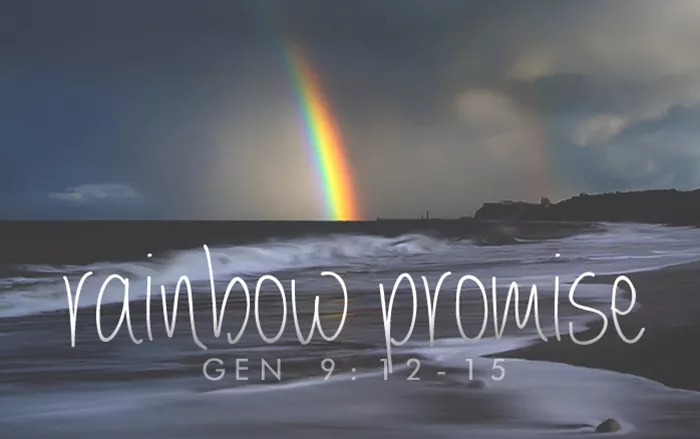Read the Daily Bible Verse Genesis 9:12 To Strengthen Your Spiritual Journey.
“Genesis 9:12 (KJV) – ‘And God said, This is the token of the covenant which I make between me and you and every living creature that is with you, for perpetual generations:'”
Genesis 9:12 KJV Background
Genesis 9:12 appears in the aftermath of the Flood, a significant event in the biblical story. The context of this verse is the covenant God makes with Noah and, by extension, with all of creation. Following the Flood, which was a divine judgment on a corrupt world, God establishes a new order for creation. This covenant is one of reassurance and renewal.
In Genesis 9:8-17, the covenant is elaborated upon, with God promising never to destroy the earth again by flood. The rainbow is given as a sign of this everlasting covenant. Genesis 9:12 focuses on this token—the rainbow—and emphasizes its perpetual nature.
Genesis 9:12 Meaning
The word “token” in Genesis 9:12 translates from the Hebrew term “ʾôt,” which means a sign or a pledge. In the biblical context, this token represents God’s solemn promise to humanity and all living creatures. This covenant is not just a promise to Noah but extends to all future generations.
The term “perpetual generations” signifies that this covenant is everlasting. Unlike other covenants that might have specific conditions or durations, this one is meant to be perpetual, highlighting the enduring nature of God’s promises. The rainbow, as the token of this covenant, serves as a divine reminder of God’s commitment to preserve creation.
See also: What Does Genesis 9:11 Mean?
Genesis 9:12 Application in Life
Understanding the application of Genesis 9:12 can have profound implications for how individuals and communities view their relationship with God and the environment.
Reassurance of God’s Promises: Genesis 9:12 reminds believers of God’s unwavering promises. In times of uncertainty or disaster, the rainbow stands as a symbol of God’s fidelity and His commitment to never again destroy the world by flood. This can provide comfort and reassurance to believers facing personal or global challenges.
Stewardship of Creation: The covenant includes every living creature, highlighting humanity’s role as stewards of God’s creation. This signifies that care for the environment is not just a practical concern but a spiritual responsibility. Believers are called to respect and preserve the natural world, recognizing that it is part of God’s enduring promise.
Symbol of Hope: The rainbow serves as a symbol of hope and renewal. It represents the beauty and promise of new beginnings after difficult times. This can encourage individuals to see beyond present struggles and look forward to future restoration and peace.
Comparison with Other Biblical Texts
To gain a fuller understanding of Genesis 9:12, it is useful to compare it with other biblical texts that discuss covenants and signs:
Genesis 15:18: In this passage, God makes a covenant with Abram (later Abraham), promising him and his descendants the land from the river of Egypt to the Euphrates. This covenant, like that in Genesis 9, is characterized by divine promise but is more focused on land and progeny rather than preservation.
Exodus 12:13: The covenant sign here is the blood of the Passover lamb, which signifies deliverance from the plague of death in Egypt. This sign, unlike the rainbow, is tied to a specific event and is part of a conditional promise related to obedience.
Hebrews 8:6: The New Testament presents a comparison between the old covenant and the new covenant established through Jesus Christ. This new covenant promises a transformation of the heart and a closer relationship with God. The old covenant signs, like the rainbow, are seen as symbols pointing to a greater fulfillment in Christ.
Revelation 4:3: In the vision of heaven, John describes a rainbow encircling the throne of God. This echoes the Genesis 9:12 promise, reinforcing the image of God’s enduring covenant and faithfulness extending into eternity.
Modern Relevance
In today’s world, Genesis 9:12 holds several layers of relevance:
Environmental Ethics: The emphasis on stewardship in the covenant encourages modern environmentalism. As climate change and environmental degradation become pressing issues, the biblical call to protect and care for creation takes on renewed significance. The rainbow as a sign of God’s covenant can inspire efforts to preserve the natural world.
Interfaith Dialogues: The universal aspect of the covenant, which includes all living creatures, offers a basis for interfaith dialogues on shared values concerning creation care and divine promises. It highlights common ground among various religious traditions in their reverence for nature and commitment to ethical living.
Personal Assurance: For individuals, the rainbow can be a personal symbol of hope and divine reassurance. In times of personal trials or societal upheaval, the rainbow serves as a reminder of God’s promise of renewal and His eternal faithfulness.
Conclusion
Genesis 9:12 encapsulates a profound aspect of the divine-human relationship through the covenant established after the Flood. The verse highlights God’s promise of preservation and His enduring commitment to creation. It invites believers to embrace their role as stewards of the earth and find hope in the eternal nature of God’s promises.
Genesis 9:12 Commentary
Genesis 9:12 is a cornerstone for understanding the nature of divine covenants in the Bible. It underscores the perpetual nature of God’s promises and the universal scope of His commitment to creation. The rainbow serves as a multifaceted symbol of hope, renewal, and divine fidelity. By reflecting on this verse, believers are reminded of their responsibility to care for the environment and to trust in God’s unwavering promises.
In sum, Genesis 9:12 not only reflects a historical covenant but also speaks to timeless truths about God’s relationship with the world. Its significance extends from ancient times to the present, offering a foundation for understanding divine promises and the ethical implications for humanity’s role in creation.

